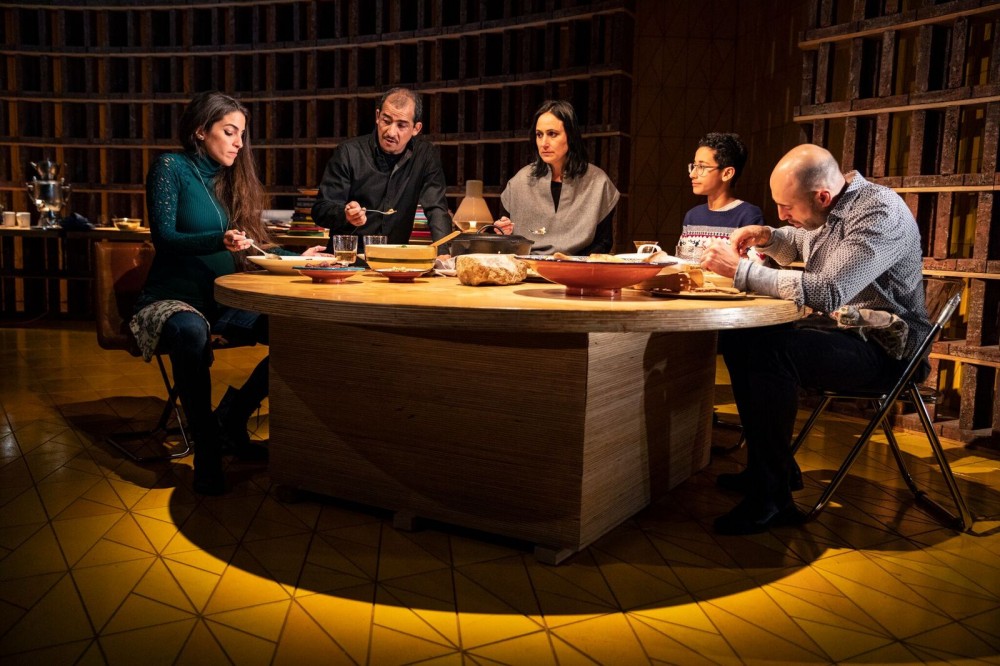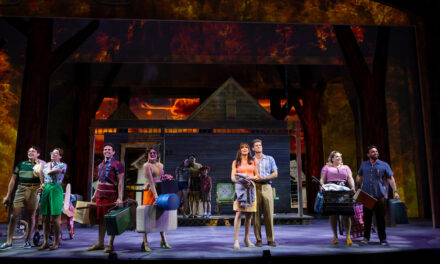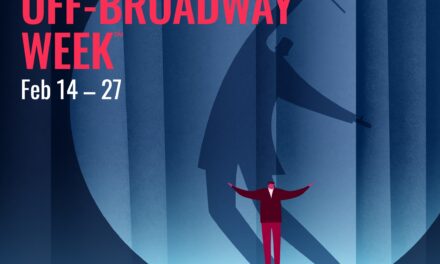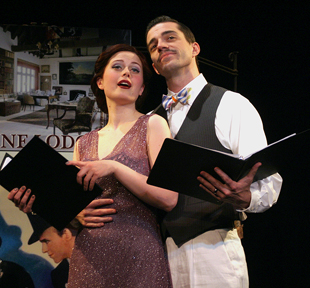by Michael Bracken
It’s Christmas, and Noura (Heather Raffo), the central character in Raffo’s eponymous drama at Playwrights Horizons, is coming apart. There is, after all, more on her plate than trimming the tree. (That’s already been handled by scenic designer Andrew Lieberman: a gorgeous towering fir blanketed in white lights dominates the stage.)
A casualty of war if ever there was one, Noura’s to-do list is existential, as are her wounds. An Iraqi Christian forced to flee her homeland with her husband, Tareq (Nabil Elouahabi), and son, Yazen (Liam Campora), a decade ago, she has to accept that Maryam (Dahlia Azama), the child she has sponsored in an Iraqi orphanage for twenty years, has a worldview very different from her own. And there’s little if any space in that worldview for Noura.
She needs to come to terms with her close friend Rafa’a’s (Matthew David) announcement that he’s thinking of moving to California. And she must create context for her new American passport, which gives her name, per her husband’s doing, as Americanized Nora.
She has to figure out who she is.
Noura is strong, but her legs are wobbly, especially when it comes to Maryam, on whom she pins so much hope. Raffo the actress creates a completely credible Noura, but the script locks her into a narrow emotional range. Her angst is understandable but stays on or near one note.
Noura’s scenes with Maryam, the only other female in the play, the only meaningful female in her life, have great dramatic potential but they’re rushed. Noura’s bought Maryam, now a student at Stanford, a ticket to fly to New York for the holidays and expects her to arrive on Christmas Day. But the girl shows up on Christmas Eve, without luggage. She tells Noura she’s been in New York for a week and is staying with a schoolmate in the Bronx. Ouch.
Maryam is intentionally pregnant and quite cavalier about it. We later learn she used the father as a means to an end and dumped him as soon as she could, once she knew she was with child. She sees that her casual attitude makes Noura uncomfortable and leaves. Christmas dinner the next day is a fiasco and lasts about five minutes. Maryam returns later to give back the necklace, a family heirloom, she received from Noura. It’s not clear why she returns it but it’s clearly another slap in Noura’s face.
Elouahabi is an easygoing yet energetic Tareq, until he learns Maryam is pregnant and becomes rigidly judgmental. Campora and David are appealing in their roles as son and friend. As Maryam, Azama is effortlessly selfish and completely insensitive to the feelings of anyone else. Her character is a bit exaggerated in her self-centeredness, but Azama bulldozes ahead with confidence and even humor.
In addition to the Christmas tree, Lieberman’s handsome set features wood paneling and a very long curved table that accommodates a variety of objects. It has an aura of masculinity, underscoring Noura’s sense of alienation in a man’s world. Director Joanna Settle, who has teamed with Raffo before, clearly understands the play and its heroine, but she can’t quite put it over the top.
Inspired by Ibsen’s A Doll’s House but possessing a personality very much its own, Noura deals with important personal themes for its main character and the playwright. These issues are largely internal, making them challenging to dramatize, and Raffo only partly meets the challenge. You can sense rage under the surface, but it doesn’t all bubble up.
Noura hammers home the destructive ripple effect of war. The physical toll on combatants and residents is horrific. The psychological and emotional aftermath on them and others is less obvious, less gruesome, but still powerful and tragic.
Photos: Joan Marcus
Through December 30 at the Mainstage Theater at Playwrights Horizons, 416 West 42nd Street.
www.phnyc.org 90 minutes with no intermission.























